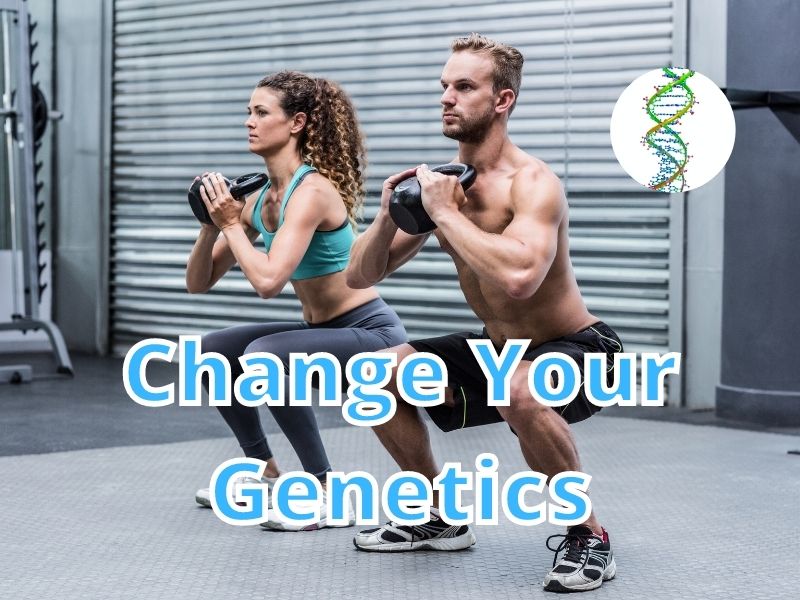Back in the 90s when I was in college I had to do a report on genetics. I found out that parents not only pass on their genes, but the positive and negative changes they’ve made to their genes.
Exercise can change your genes by turning on and off how your gene express themselves, such as whether they make a protein or not. These changes can have positive effects on your health in the short and long term.
There are so many diets and exercise programs out there that claim to help you change your life, but end up not helping long term. True change occurs through consistent effort over time. Exercising your body can affect lasting changes on a genetic level. Let’s find out how this happens.
Why Exercise Choices Make a Difference
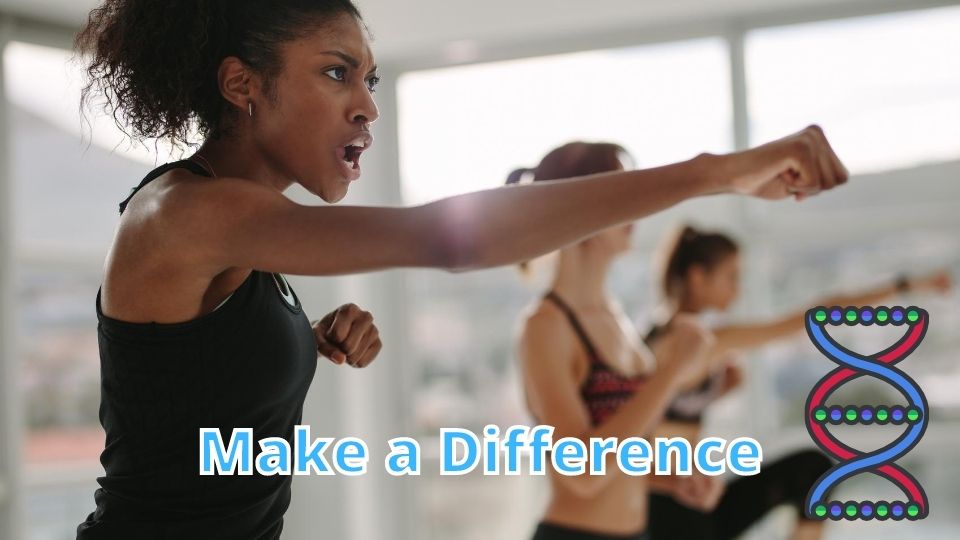
Most people say they want to be healthy, but it may seem like a difficult challenge. The environments we find ourselves in may not be conducive to a healthy lifestyle. Sometimes we need someone to help us along the way.
Genetic changes can occur that will help with our health if we exercise. If we are working toward getting healthy on a consistent basis the muscles “adapt” and their gene expression is different. (bionews.org.uk)
Our genes are the same, but how they work is different. Scientists have shown that some genes are on and some are off, and this can have a dramatic effect on our health.
When scientists found out that diet was able to change the gene expression for fat reduction in mice, they must have been very excited. Two identical “twin sister” mice had dramatically different weights because of gene expression. (nature.com)
They learned that diet can switch gene expression off, so the fat mice could get skinny again. Unfortunately, in humans, there’s no one magic food we can eat that makes us skinny.
Another study involving rats showed how in early life, baby rats with caring mothers had an epigenetic change that helped them remain calm in life. While baby rats that were ignored, grew “up to be anxious.” (learn.genetics.utah.edu)
When we choose to move our body, we are signaling our muscles we need to work. How much we move can signal to our genes what they should do. These signals say to the muscles and body, stay the same, or we need to make some changes.
A more intense workout may signal – “Hey muscles, we need to make a change here.” One study showed a “20-minute workout” may lead to changing how our genes work. (nfpt.com)
The study showed that muscles were now helping “generate enzymes required to burn calories and produce energy.”
How Exercise Changes Our Genetics
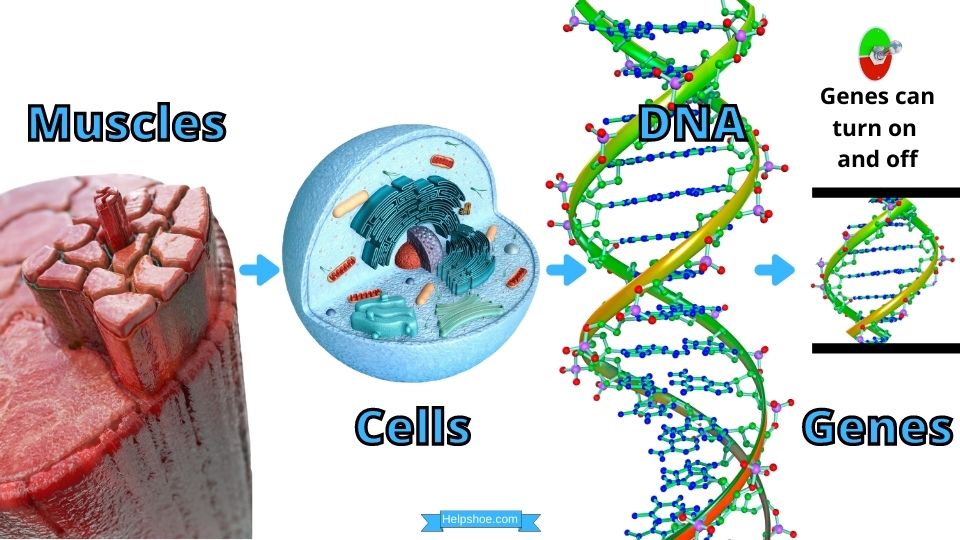
Your body is made up of cells. Each cell has lots of genes. These genes are segments of your DNA. They can give instructions to your body.
Your body is made up of cells. Each cell has lots of genes. These genes are segments of your DNA. They can give instructions to your body.
When your genes are on, off, or somewhere in the middle, this is called gene expression. The DNA is the same but parts of it are on or off, to instruct the body to do different things.
The genes can give instructions to tell the body to make energy. As previously mentioned, scientists used a 20-minute cycling workout to determine if the genes would make changes.
The genes did and started to tell the body to make more enzymes, therefore more muscle energy. It is interesting how our physical activities can change how our genes give instructions to our bodies.
So, each time we exercise we are giving our genes a chance to change their expression, but does that mean it will last a lifetime?
How Long Does It Take
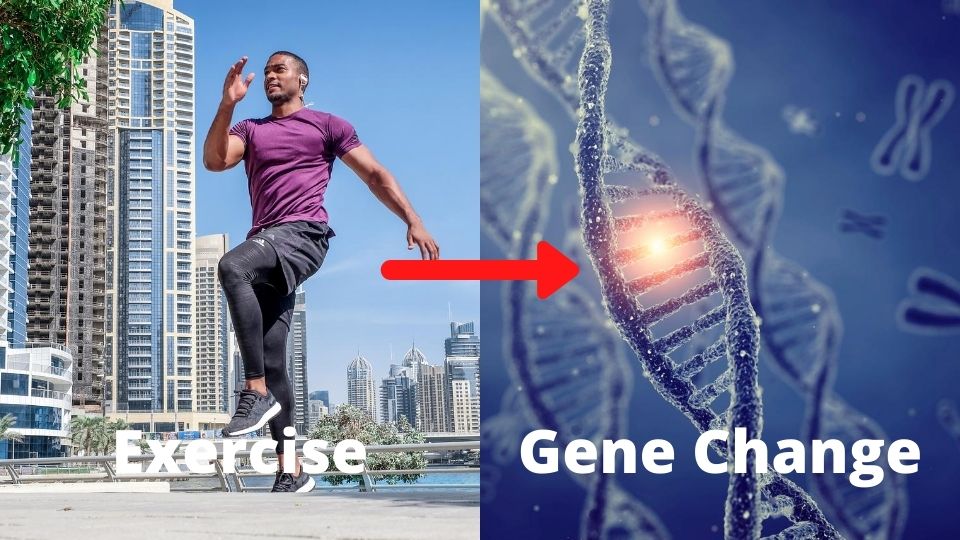
When scientists tried the 20-minute exercise experiment with healthy individuals they immediately began to receive the benefits of energy production. The genes were actively telling the body what to do.
Long-term changes may take longer. Once the experiment was over, the genes slowly stopped helping make energy. They didn’t permanently change.
Another similar study, this time for 3 months, with 45 minutes exercise sessions 4 times a week, showed more permanent changes.
One leg was exercised, while the other was not. In the exercised leg, “over 5000 places on the muscle” had signs of “methylation patterns”. (henryford.com)
Long-term change takes time, in part because our body can’t change quickly, and in part because we need to do the right things to help it, including a healthy diet.
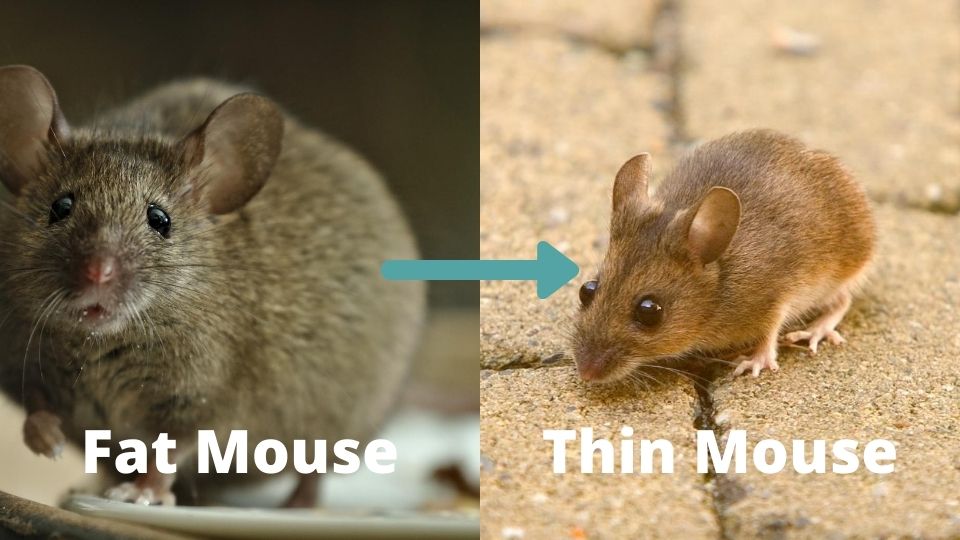
When fat mice with the agouti gene were given a healthy diet with methyl groups (contained in health foods and vitamins) they slowly began to get healthier, over two generations.
The fat genes took time to turn off completely. An since the gene expression (if the gene is off or on) passes down from one generation to the next, the mice children received the benefit of their parents’ healthy food choices.
So, permanent changes may take longer, but short-term changes are possible in a single day.
For those looking for long-term change, consider regular exercise and eating foods that are “rich in folate (vitamin B9) including leafy green vegetables, citrus fruits, and strawberries, are dietary sources of methyl. Vitamin B12, found in fish, meat, milk, and eggs, can donate methyl groups.” (epigenome.eu)
By eating healthy and exercising, we are making genetic changes from a two-sided approach.
If we exercise more often and give our body the methyl groups it needs, it makes sense that genes will stay on or off for longer periods to help the body adapt to our exercise patterns.
What Kind of Exercise Helps Genes
It’s important to exercise regularly for our health. According to drtracygapin.com we need to have intense workouts if we expect to change our gene expression.
The idea of intense exercise is that it helps with moving methyl groups. That way we can turn off or on certain genes that help our bodies stay healthy.
So, an intense workout will likely help our genes express in ways that help create a healthy body.
Genes are kinda like managers. Their in charge of what happens. When we exercise, genes say things like – We need to help these muscles have enough energy. If we don’t exercise, the genes may be sitting idle or not give as helpful instructions.
The more we move the better off we are. Research suggests that just moving more, in general, can help prevent problems from occurring.
My theory is that we as humans are not meant to sit for long periods. Like other animals on the planet, we need to stay physically active in order to remain in good physical shape.
There are still lots of unknowns about gene expression and how our behaviors and diet affect change. But, it’s clear to me that our bodies can’t function at optimum health without regular exercise and a healthy diet.
Diet and Exercise Work Together for Genetic Change
There’s information in that food. In other words, as bits and pieces of food are broken down into their building blocks, they can be used by the genes. Genes need amino acids to build protein that is used for many operations in the body.
But, if I decide to eat fast food for a week, some of the nutrients my body needs are not available, and my cell and genes may not have the building blocks to make the proteins I need. “It is now well established that the expression of many genes is, in part, constrained by the nutrient environment.” (encyclopedia.com)
Just like a car, our genes act like machinery. They are busy running all the time if needed. Through exercise and diet, we are deciding how these genes work.
Like a car, our bodies need the right kind of care. If we don’t put effort into taking care of our bodies, our genes won’t be able to create positive change.
If you want to learn more about how genes make proteins, this video is helpful.
While there’s still a lot we don’t know about all the changes that occur genetically from exercise, we can see the outward effects over time.
Final Thoughts
Exercise matters. We can make small changes or big changes, and our genetics will respond to our efforts. Here are some of the benefits that can occur.
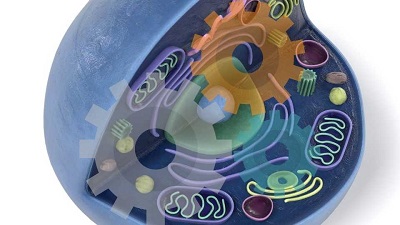
Our cells are always at work helping provide the genes a helpful environment to produce proteins.
Main Benefits of Exercise to Change Our Genes:
- Changes in Gene ExpressionOur muscles can produce more energy.
- Intense Exercise Creates ChangeMoves methyl groups for more change.
- Just Moving HelpsWhen we move, our genes can create positive change, in theory. Health science back this up.
We may feel that everything is fine with our body because we aren’t sick or in pain, but our cells may not be able to do their jobs effectively unless we get moving and more specifically do exercise.
If we change our diet and exercise, our genes may make even more positive changes, likely resulting in a healthier body.
Thanks for visiting Helpshoe.com
References
https://www.nature.com/scitable/topicpage/obesity-epigenetics-and-gene-regulation-927/
https://learn.genetics.utah.edu/content/epigenetics/rats/
https://www.bionews.org.uk/page_93482
https://www.nfpt.com/blog/can-working-out-change-your-genetics
https://epigenome.eu/en/2,5,129.html (Page not available)
https://www.henryford.com/blog/2016/06/the-science-of-fitness-does-exercise-change-your-dna

